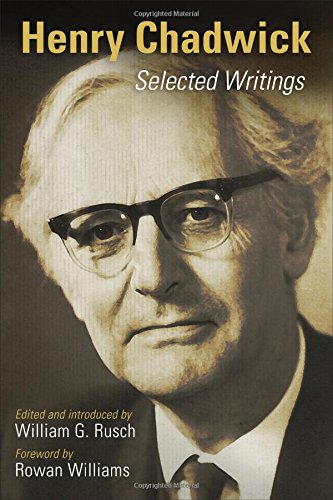A Book Review from Books At a Glance
By Michael A. G. Haykin
When I was studying early Christianity at the University of Toronto in the late seventies and early eighties, the doyen of Anglophone Patristic studies was undoubtedly Henry Chadwick (1920–2008). His peerless scholarship and winsome commitment to the Christian Faith made him a fabulous mentor for a budding scholar. His magisterial work The Early Church (first published in 1968) was one of my go-to textbooks for a number of years when I taught the first half of the survey of Church History (100–1200 ad). And even after I decided to use a multi-author volume for the entire period covered by this survey, I continued to read his work and profit immensely by it. As the editor of this superb collection of essays, William G. Rusch, notes: “The vast majority” of Chadwick’s articles are “as relevant for the study of early Christianity as when they were first written” (p.xii). Hopefully, there might be a full collection of his written corpus at some point down the road. Till then, though, this selection is a superb demonstration of the truth of Rusch’s observation.
The papers are clustered around a number of themes: the question of leadership in the ancient Church; key conciliar decisions of the fourth and fifth centuries; the interface of Christian and pagan thought; and “a clutch of essays on aspects of Augustine” (p.vii), including two great essays penned after the discovery of a number of hitherto unknown letters and sermons in the closing decades of the twentieth century. A foreword by Rowan Williams commends the selection by this premier scholar who was “learned, irenic but not bland” (p.viii) and then Rusch outlines each of the essays (he divides them into seven overall sections, p.xii–xxxii). The original context where each essay can be found is noted in a list of “Credits and Permissions” at the close of the book (p.318–320). Rusch has rightly sought to preserve each article in its original form.
The essays reveal a master scholar who has a vast knowledge of the primary literature and all of its nooks and crannies. As such, his various judgments about debated matters carry enormous weight. For example, he argues convincingly for Ossius of Cordova’s presidency at the Council of Antioch in 325—a warm-up as it were to the Council of Nicaea (p.87–100). He suggests provocatively that Paul, rather than Peter, has a much better claim to be “the founder of the papacy” (p.125), the conclusion of a fascinating overview of rival views of authority in the early Church (p.115–125): the Western churches regarded early Christianity as an ellipsis with two foci—Jerusalem and Rome—while the Eastern churches operated with the concept of a circle centered around Jerusalem. And Chadwick’s “On Re-reading the Confessions” of Augustine makes the case that the work is intimately linked to his calling as a bishop (p.210–227). In Chadwick’s words: “no work by Augustine reveals more about his understanding of the high calling of the priesthood, even though ordination is never a subject under discussion in the book” (p.227).
And time and again Chadwick delights the reader with his scintillating descriptions and prose. The late fourth-century bishop of Rome, Damasus, is described as “the kind of person who liked tidying things” (p.147). Tracing the history of certain elements relating to the burial places of Peter and Paul in Rome, Chadwick drily observes, “[s]eldom has so much history been constructed out of so little actual testimony” (p.138). The driving force behind the Chalcedonian Definition is undoubtedly “soteriological: for our redemption we need a mediator who is fully God and fully man” (p.114). The distinctiveness of Christian ethics lay “in the conception of divine grace. The characteristic stress on humility is the correlative of that” (p.271). It is naïve to think that the first preachers of the gospel “brought a brilliant light and radiant purity into the Stygian darkness of a polytheistic society, the supreme values of which were nothing but power, honour, wealth, and sex” (p.267). And then this fabulous summary of Augustine’s life:
His biography might be summarized as that of a bookish but highly sexed man who painfully brought himself to renounce marriage and a secular career to become a contemplative ascetic, but who was then dragged from his quiet quasi-monastic life to serve a troubled and turbulent church which needed him as a pastor and defender of the faith. (p.213).
In a very few areas, awareness of more recent trends in scholarly discussion might have led to a qualification of his assertions. For instance, he comments that “a great body of testimony from inside” Messalianism can be found in the “Homilies of Macarius” or Symeon of Mesopotamia (p.54). The consensus of contemporary thinking, however, is that Macarius is not be taken as a representative of Messalianism. But such needed corrections are rare indeed, making this a very valuable collection of essays.
Michael A.G. Haykin
Chair and Professor of Church History
The Southern Baptist Theological Seminary.
